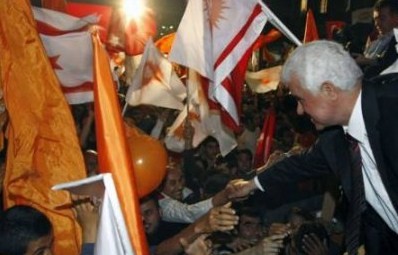
Turkish Cypriot Prime Minister Eroglu Visits Ankara
Publication: Eurasia Daily Monitor Volume: 6 Issue: 113
By:

The E.U. has set December 2009 as the deadline for Turkey to open its ports and airports to Greek Cypriots, and failure to comply might result in the suspension of talks on membership. Resolving the Cyprus issue is a critical part of the conditions set by the E.U. for Turkey’s future membership. The E.U. Commissioner for Enlargement Olli Rehn said that "Turkey must overcome internal divisions and reactivate its long-delayed reforms, while a comprehensive settlement for Cyprus must be achieved this year (Hurriyet Daily News, December 21, 2008). In a recent interview Rehn suggested that Turkey needed to reconsider its responsibilities as determined by the Ankara protocol signed in 2005. In that protocol, Turkey indirectly recognized Greek Cyprus as the "Republic of Cyprus," which provided the justification for Greek Cypriots requesting the re-opening of the ports (www.abhaber.com, February 2, 2005; Anka Habar Ajansi, June 9).
However, three recent developments dominate the debate, which might further complicate the issue. In the European parliamentary elections, it appears that the "anti-Turkey" camp has gained in strength. Despite the E.U. parliament playing only a limited role in relations between Turkey and the European Union, the strengthening of this movement against the country might further strain the membership process (EDM, June 10).
The second development that risks undermining the process was the election in April in the Turkish Republic of Northern Cyprus (KKTC), which secured victory for the National Union Party led by Dervis Eroglu. Eroglu is known for supporting Turkey’s pre-2004 policies, which were based on rejecting international cooperation. However, since 2004 Ankara has taken a new initiative requiring its full cooperation with the international community, and has supported the United Nation’s Annan Plan. Eroglu’s party opposed this plan in 2004.
Turkish political observers believe that the ruling National Union Party led by Ergolu might present an obstacle for Turkey’s efforts to secure a lasting solution to the Cyprus issue. Perhaps for this very reason, Eroglu promised in his victory speech that he will continue supporting the negotiation process between the two sides of the Cypriot island (Yeni Safak, April 21).
After he formed his cabinet, Eroglu visited Ankara and met the Turkish Prime Minister Recep Tayyip Erdogan. At a joint press conference with his Turkish counterpart, Eroglu stressed that the KKTC needed greater economic support from Turkey to strengthen its negotiating position. Eroglu declared that the priority for his government is to maintain Turkey as an effective guarantor of Turkish Cypriots (Anadolu Ajansi, June 11).
Erdogan, during the press conference stated that Turkey recognized the U.N. as the only mechanism for addressing the issue. In his opinion the U.N. Secretary-General must address the question based on recognizing that both sides have equal rights in ruling the governments in the island (Sabah, June 12).
It appears that Ankara wants to limit the E.U.’s involvement in the Cyprus question, since the Greek Cypriots are already a full member and could block Turkey’s accession talks. Rehn, on the other hand, said that any solution should be consistent with E.U. principles. The E.U. is willing to contribute to the efforts to resolve the issue (www.abhaber.com, June 9).
The spokesman for the KKTC President Mehmet Ali Talat, said that while the Turkish side of the island has tried everything possible, the Greek part has concentrated mainly on Turkey’s E.U. membership plans, and wants the commission’s review in December to slow the negotiation process (Ihlas Haber Ajansi, June 9).
While the debate over whether the E.U. should be involved in the negotiation process continues, the current talks (which began in September 2008), have prepared Turkish public opinion for some of the country’s land being ceded to Greek Cyprus. Talat recently confirmed that the talks had reached the stage where the land issue might be discussed. "Our parliament in an earlier period, took a decision that allows granting some of our lands to the Greek side. However at this point, we do not know where or how much land we will grant" (NTV, May 31).
The third development that disappointed Turkish Cypriots was the request by the E.U. Commission for Turkey to obey the rulings of the European Court of Human Rights, which granted the rights of Greek Cypriots fleeing their properties in 1974 to return (www.abhaber.com, June 11). Turkish Cypriots have opposed this ruling and protested against the E.U.’s demands to allow Greek Cypriots to return to their former homes on the Turkish side of the island (Hurriyet, June 9).
Neo-nationalists have already poisoned the atmosphere, alleging that the ruling AKP government in Ankara has been selling Turkish land to foreigners, which is a very sensitive issue within both Turkey and Cyprus. In this context, it is likely that the negotiation process in Cyprus, combined with E.U. pressure on the Turkish side, could trigger a new wave of neo-nationalism which might disrupt Turkey’s ambitions to become a member of the E.U.




